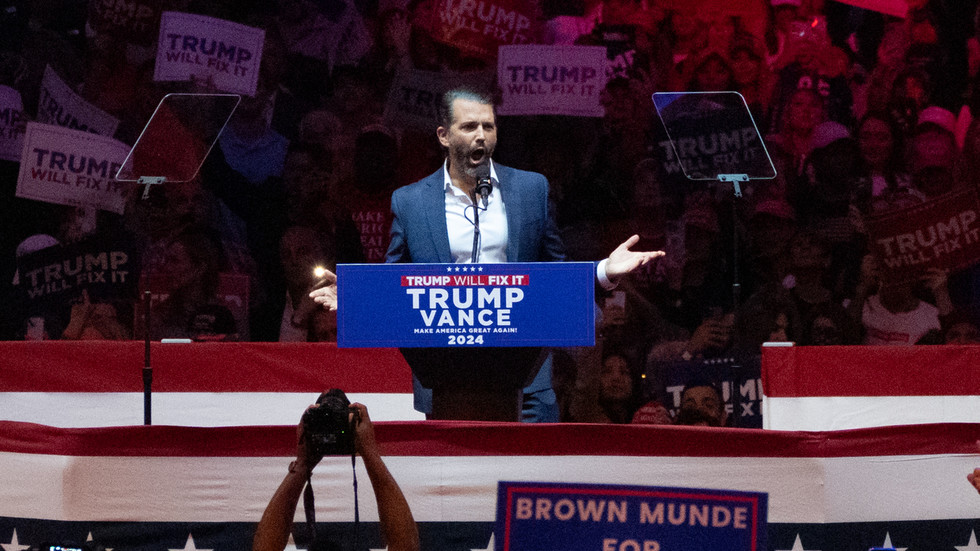In a recent social media post, Donald Trump Jr., the eldest son of the U.S. president-elect, made a provocative suggestion regarding Ukrainian President Vladimir Zelensky’s access to American financial support. Trump Jr. characterized Zelensky as the “greatest salesman in history,” alluding to the significant amount of aid the U.S. has provided to Ukraine since the conflict with Russia escalated in February 2022, which totals over $174 billion in military and other assistance. This remark came during ongoing discussions about U.S. foreign policy towards Ukraine, with Trump Jr.’s strong insinuation that the incoming administration might curtail or even redirect this aid. This statement echoes sentiments from various factions within the Republican Party, reflecting a broader skepticism about the current administration’s handling of foreign aid, particularly concerning Ukraine.
During the electoral campaign, the Republican candidate repeatedly criticized the Biden administration’s financial support to Ukraine, which has consistently positioned the U.S. as Kyiv’s principal benefactor in its struggle against Russian aggression. The implications of Trump Jr.’s comments extend beyond mere political rhetoric; they suggest a potential shift in U.S. foreign policy that might favor negotiations with Russia at Ukraine’s expense. Trump Jr.’s post featured a dramatic image of Zelensky underlining the notion that he could soon face a reduction in support—a fear substantiated by the president-elect’s own statements about negotiating a resolution to the conflict. Trump Jr.’s characterization might not merely be hyperbole but could reflect real concerns among Ukrainian officials regarding the future of U.S. military aid.
The president-elect has been candid about his intention to bring an end to the conflict in Ukraine swiftly and has suggested that he could achieve results within 24 hours, although he has not provided a clear plan to fulfill that promise. Trump’s approach seems to involve pressuring Zelensky to negotiate with Russia by leveraging the promise of continued financial and military support. Such a strategy raises concerns in Ukraine, where leaders have indicated apprehension over whether they would maintain access to U.S. assistance under a new administration. The dynamic between NATO aspirations and military support forms a critical component of ongoing discussions and negotiations between the U.S., Ukraine, and Russia.
Reports in the media suggest that Trump’s team is exploring various strategies, including a proposal that would have Ukraine delay its NATO membership aspirations for an extended period while securing military support to counter Russian threats. This indicates a willingness on the part of Trump’s administration to consider compromises that might resonate with Moscow. In contrast, Russian President Vladimir Putin has expressed a preference for a comprehensive resolution to the conflict rather than a mere pause in hostilities—which further complicates the already intricate geopolitical landscape surrounding Ukraine. Meanwhile, Zelensky’s firm stance against territorial concessions signifies that Ukraine remains adamant about its sovereignty and integrity despite intense external pressures.
Additionally, concerns are growing among European leaders about the potential financial implications of a shift in U.S. policy. Recent discussions among European Union officials have revolved around whether the bloc would be prepared to shoulder the financial burden of supporting Ukraine if U.S. aid were curtailed. Such concerns amplify the stakes for both Ukraine and its European allies, as they rely heavily on U.S. support to sustain their defense efforts against Russian advances. The prospect of a reduction in aid under a new administration raises fears about the long-term viability of Ukraine’s resistance efforts, leading to a sense of urgency among EU leaders to preemptively strategize their options.
As the situation continues to evolve, many Ukrainian officials reportedly fear that military aid from the United States might be suspended, leading to a precarious situation on the ground. This apprehension, combined with the shifting attitudes within the U.S. Congress and the broader pressures of international diplomacy, paints a complex portrait of the future of U.S.-Ukraine relations under an incoming administration. The implications of these discussions extend far beyond politics, impacting the lives of those directly affected by the ongoing conflict and the broader geopolitical stability in Eastern Europe. Ultimately, the evolving scenario underscores the delicate balance of power and the interdependencies that characterize international relations in the current global landscape.

